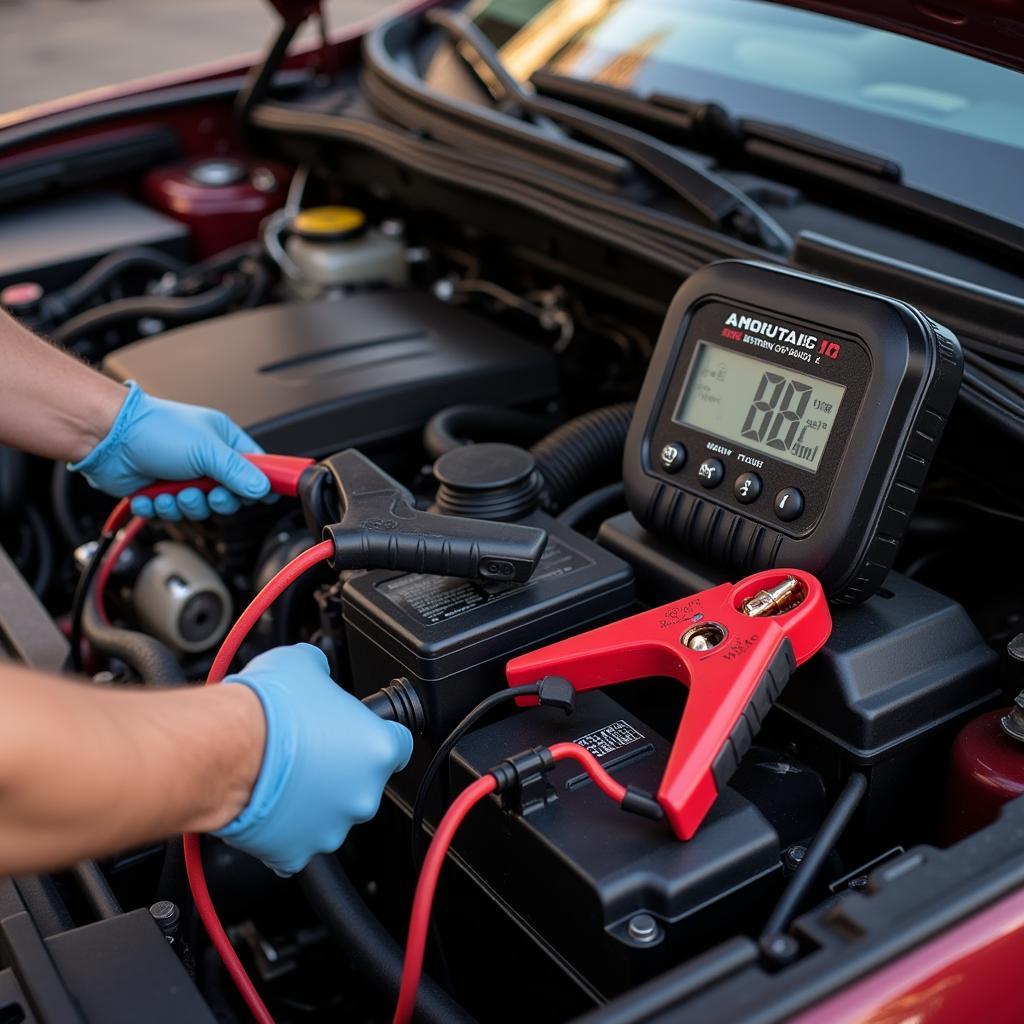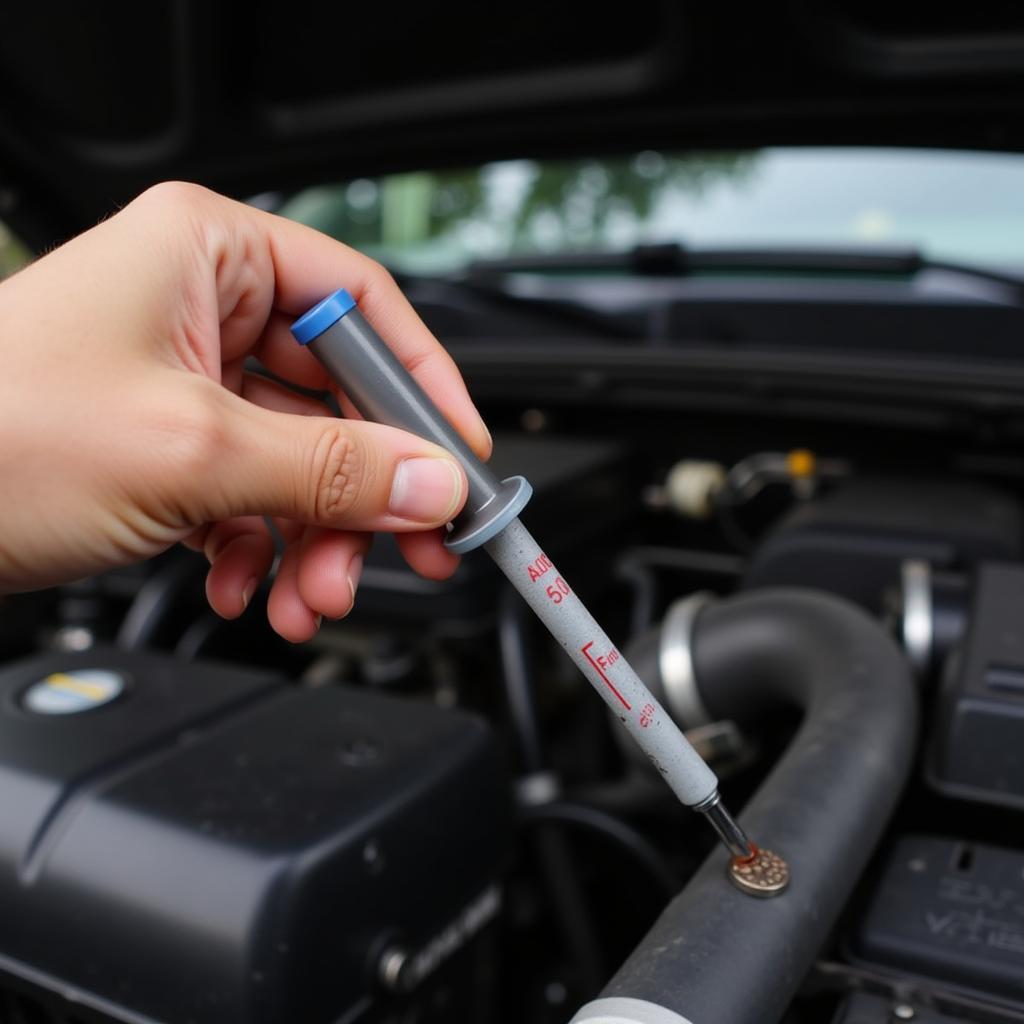A car that won’t start promptly can be a frustrating experience, leaving you stranded and wondering what’s wrong. While there are many reasons why your car might be having trouble starting, understanding the common culprits can help you troubleshoot the issue and get back on the road quickly. This article will delve into the most frequent causes of Car Late Starting Problems, provide practical troubleshooting tips, and guide you toward effective solutions.
Common Causes of Car Late Starting Problems
The reasons why your car might struggle to start can be categorized into several key areas, including:
Battery Issues
A weak or failing battery is often the leading cause of a car that starts slowly or intermittently. Here’s how to identify a battery problem:
- Slow Cranking: The engine turns over sluggishly when you try to start the car.
- Dim Lights: The dashboard lights and headlights appear dimmer than usual.
- Clicking Noise: You might hear a clicking sound when you turn the key, indicating a weak battery connection.
Pro Tip: Regularly check your battery terminals for corrosion and clean them with a wire brush or baking soda solution.
Starter Motor Issues
The starter motor is responsible for turning the engine over. If it’s malfunctioning, your car won’t start. Symptoms of a failing starter motor include:
- Clicking Sound: You hear a clicking sound when you try to start, but the engine doesn’t turn over.
- Grinding Noise: A grinding noise could signify a damaged starter motor or a problem with the starter gear engagement.
- No Response: The engine remains silent when you turn the key.
Pro Tip: Have your starter motor tested by a qualified mechanic to ensure it’s functioning properly.
Fuel System Problems
Issues with the fuel system, such as a clogged fuel filter or a faulty fuel pump, can prevent fuel from reaching the engine, hindering starting. Look for these signs:
- No Fuel Smell: You don’t smell any fuel when trying to start the car.
- Engine Stalls: The engine starts but immediately stalls or runs rough.
- Weak Acceleration: The car accelerates slowly or has trouble reaching high speeds.
Pro Tip: Regularly replace your fuel filter to prevent clogging and ensure efficient fuel delivery.
Ignition System Problems
A malfunctioning ignition system, including the ignition coils, spark plugs, or distributor, can lead to an inability to start. Consider these indicators:
- Misfiring: The engine sputters or runs erratically, even when started.
- Spark Plug Issues: Worn-out or damaged spark plugs can hinder combustion.
- Ignition Coil Failure: A faulty ignition coil may prevent spark from reaching the spark plugs.
Pro Tip: Have your ignition system inspected and serviced regularly to ensure it’s functioning correctly.
Other Factors
Beyond these common causes, several other factors can contribute to late starting problems:
- Loose or Corroded Connections: Check for loose or corroded connections in the electrical system, including battery terminals, starter cables, and wiring to the fuel pump and ignition components.
- Low Engine Oil: Insufficient oil can cause friction and impede engine starting.
- Environmental Factors: Extremely hot or cold temperatures can affect the starting process.
- Engine Flooding: Over-filling the engine with fuel can lead to difficulty starting.
Troubleshooting Car Late Starting Problems
Now that you understand the potential causes, it’s time to troubleshoot the issue:
1. Check the Battery
- Use a Multimeter: Measure the battery voltage. A fully charged battery should have a voltage of 12.6 volts or higher.
- Jump-Start the Car: If the battery is low, try jump-starting it with a good battery.
- Replace the Battery: If the battery is faulty, replace it with a new one of the correct size and type.
2. Inspect the Starter Motor
- Listen for Clicking: A clicking sound suggests a faulty starter motor or a problem with the starter solenoid.
- Check for Grinding: A grinding noise indicates a damaged starter motor or a problem with the starter gear.
- Visual Inspection: Visually inspect the starter motor for any obvious damage or loose connections.
3. Examine the Fuel System
- Check the Fuel Filter: Inspect the fuel filter for dirt or debris. A clogged filter can prevent fuel flow.
- Listen for Fuel Pump Noise: When you turn the key, you should hear a humming sound from the fuel pump.
- Check Fuel Lines: Visually inspect fuel lines for leaks or blockages.
4. Test the Ignition System
- Inspect Spark Plugs: Check the spark plugs for wear and tear. Replace any damaged plugs.
- Inspect Ignition Coils: Examine the ignition coils for cracks or other signs of damage.
- Check for Spark: Test the spark plugs for a strong spark using a spark plug tester.
5. Address Other Factors
- Check Connections: Inspect all electrical connections for looseness or corrosion.
- Check Engine Oil Level: Ensure the engine oil level is at the recommended level.
- Consider Environmental Factors: If temperatures are extreme, consider the impact on the engine.
- Avoid Over-filling: Be careful not to over-fill the engine with fuel.
Expert Insights:
“A car that won’t start promptly can be a frustrating experience, but a systematic approach to troubleshooting can save you time and money. Start with the simple things, like checking the battery and inspecting connections, and work your way through the potential causes. Don’t hesitate to seek professional help if you’re unsure how to proceed.” – John Smith, Master Automotive Technician
“If you’re unsure of the cause of a late starting problem, it’s always best to consult a qualified mechanic. They can diagnose the issue accurately and recommend the appropriate repairs.” – Emily Davis, Automotive Specialist
Conclusion:
A late starting problem can be caused by various factors, from a simple battery issue to more complex engine problems. By understanding the common culprits and following these troubleshooting tips, you can hopefully identify and resolve the issue quickly. If you are still experiencing problems, don’t hesitate to seek professional assistance.
For more information about car maintenance and repair, visit Autotippro at common car service problems neglected.
Contact AutoTipPro:
- Phone: +1 (641) 206-8880
- Office: 500 N St Mary’s St, San Antonio, TX 78205, United States
FAQ
Q: Why does my car start slowly in cold weather?
A: Cold weather can thicken engine oil, making it harder for the starter motor to turn the engine over. It can also reduce battery performance.
Q: What does it mean when my car starts then dies?
A: This could indicate a fuel delivery problem, a faulty ignition system, or a vacuum leak.
Q: Should I jump-start my car if it’s a starter problem?
A: No, jump-starting won’t fix a starter issue. If you suspect a starter problem, avoid jump-starting and seek professional help.
Q: How often should I replace my battery?
A: Most car batteries have a lifespan of 3-5 years. However, factors like weather and usage can shorten this lifespan.
Q: Can I check my spark plugs myself?
A: Yes, you can check your spark plugs yourself if you have the necessary tools and knowledge. But it’s recommended to have a qualified mechanic inspect the plugs.
Q: What is the best way to maintain my car’s ignition system?
A: Regularly replacing spark plugs and keeping the ignition coils clean and free of corrosion is essential.







Leave a Reply